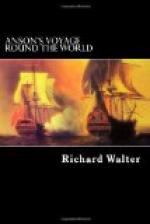CHAPTER 8. JUAN FERNANDEZ—THE TRIAL REJOINS.
THE SEARCH FOR JUAN FERNANDEZ.
It were endless to recite minutely the various disasters, fatigues, and terrors which we encountered on this coast; all these went on increasing till the 22nd of May, at which time the fury of all the storms which we had hitherto encountered seemed to be combined, and to have conspired our destruction. In this hurricane almost all our sails were split, and great part of our standing rigging broken; and, about eight in the evening, a mountainous overgrown sea took us upon our starboard quarter, and gave us so prodigious a shock that several of our shrouds broke with the jerk, by which our masts were greatly endangered. Our ballast and stores, too, were so strangely shifted that the ship heeled afterwards two streaks to port. Indeed, it was a most tremendous blow, and we were thrown into the utmost consternation from the apprehension of instantly foundering. This was the last effort of that stormy climate, for in a day or two we found the weather more moderate than we had yet experienced since our passing Straits le Maire. And now having cruised in vain for more than a fortnight in quest of the other ships of the squadron, it was resolved to take advantage of the present favourable season and the offing we had made from this terrible coast, and to make the best of our way for the island of Juan Fernandez.* For though our next rendezvous was appointed off the harbour of Baldivia, yet as we had hitherto seen none of our companions at this first rendezvous, it was not to be supposed that any of them would be found at the second; indeed, we had the greatest reason to suspect that all but ourselves had perished. Besides, we were by this time reduced to so low a condition that, instead of attempting to attack the places of the enemy, our utmost hopes could only suggest to us the possibility of saving the ship, and some part of the remaining enfeebled crew, by our speedy arrival at Juan Fernandez; for this was the only road in that part of the world where there was any probability of our recovering our sick or refitting our vessel, and consequently our getting thither was the only chance we had left to avoid perishing at sea.
(Note. ‘Juan Fernandez.’ This island which is 13 miles long by 4 miles broad, now belongs to Chili. It was discovered in 1563 by Juan Fernandez. As it was unoccupied it was a favourite resort of the buccaneers throughout the seventeenth century, as well as of English squadrons despatched like those of Dampier and Anson, to prey on Spanish commerce, and needing to refit and water after the long voyage round Cape Horn. The Spaniards at last occupied it in 1750, in self-defence. It was here that Alexander Selkirk was put ashore in 1704.)




